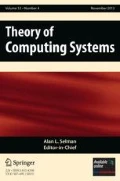Abstract
Using the concept of test functions, we develop a general framework within which many recent approaches to the definition of random sequences can be described. Using this concept we give some definitions of random sequences that are narrower than those proposed in the literature. We formulate an objection to some of these concepts of randomness. Using the notion of effective test function, we formulate a thesis on the “true” concept of randomness.
Similar content being viewed by others
References
E. Bishop,Foundations of Constructive Analysis, McGraw-Hill, New York, 1967.
L. E. J. Brouwer, Begründung der Mengenlehre unabhängig vom logischen Satz vom ausgeschlossenen Dritten. Zweiter Teil. Verh. Niederl. Akad. Wetensch. Afd. Natuurk. Sect. I12 (1919), 7.
J. Hartmanis andR. E. Stearns, On the computational complexity of algorithms,Trans. Amer. Math. Soc. 117 (1965), 285–306.
A. N. Kolmogoroff, Tri podhoda k opredeleniju ponjatija “količestvo informacii”,Problemy Peredači Informacii 1 (1965), 3–11.
D. Loveland, On minimal program complexity measures,ACM Symposium on Theory of Computing, pp. 61–66, May 5–7, 1969.
P. Martin-Löf, The definition of random sequences,Information and Control 9 (1966), 602–619.
P. Martin-Löf, Complexity oscillations in infinite binary sequences, unpublished.
R. von Mises, Grundlagen der Wahrscheinlichkeitstheorie,Math. Z. 5 (1919), 52–99.
C. P. Schnorr, Eine Bemerkung zum Begriff der zufälligen Folge,Z. Wahrscheinlichkeitstheorie Verw. Gebiete 14 (1969), 27–35.
C. P. Schnorr, Über die Definition von effektiven Zufallstests, I–II,Z. Wahrscheinlichkeitstheorie Verw. Gebiete 15 (1970), 297–312, 313–328.
C. P. Schnorr, Klassifikation der Zufallsgesetze nach Komplexität und Ordnung,Z. Wahrscheinlichkeitstheorie Verw. Gebiete 16 (1970), 1–21.
C. P. Schnorr, Über die Zufälligkeit und den Zufallsgrad von Folgen, Symposium on Formale Sprachen und Automatentheorie, Oberwolfach, 1969.
E. Specker, Nicht konstruktiv beweisbare Sätze der Analysis,J. symb. Logic 14 (1949), 145–158.
R. J. Solomonoff, A formal theory of inductive inference, I,Information and Control 7 (1964), 1–22.
J. Ville,Étude Critique de la Notion de Collectif, Gauthiers-Villars, Paris, 1939.
C. P. Schnorr, Zufälligkeit und Wahrscheinlichkeit,Lecture Notes in Mathematics (in preparation).
M. Davis,Computability and Unsolvability, McGraw-Hill, New York, 1958.
Author information
Authors and Affiliations
Rights and permissions
About this article
Cite this article
Schnorr, C.P. A unified approach to the definition of random sequences. Math. Systems Theory 5, 246–258 (1971). https://doi.org/10.1007/BF01694181
Received:
Revised:
Issue Date:
DOI: https://doi.org/10.1007/BF01694181




